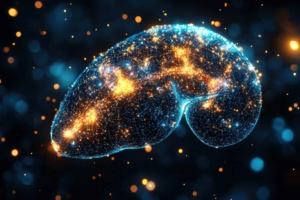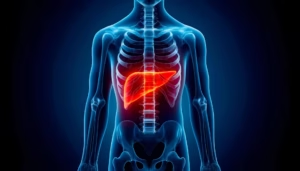 Metabolic dysfunction-associated steatohepatitis (MASH), formerly known as NASH, is a progressive liver disease caused by a buildup of fat cells, which leads to chronic inflammation. MASH often occurs alongside obesity, type 2 diabetes and high cholesterol. While fat accumulation and insulin resistance cause MASH, immune activation drives disease progression. Dysfunction in both innate and adaptive immune responses sustains this inflammation, causing potentially life-threatening complications, including fibrosis and cirrhosis.1,2 This has led to the development of therapies that target immunometabolism, aiming to disrupt both the metabolic and immune drivers of liver injury.
Metabolic dysfunction-associated steatohepatitis (MASH), formerly known as NASH, is a progressive liver disease caused by a buildup of fat cells, which leads to chronic inflammation. MASH often occurs alongside obesity, type 2 diabetes and high cholesterol. While fat accumulation and insulin resistance cause MASH, immune activation drives disease progression. Dysfunction in both innate and adaptive immune responses sustains this inflammation, causing potentially life-threatening complications, including fibrosis and cirrhosis.1,2 This has led to the development of therapies that target immunometabolism, aiming to disrupt both the metabolic and immune drivers of liver injury.
Originally approved for diabetes and obesity, semaglutide, a GLP‑1 receptor agonist, has also been shown to reduce inflammation in addition to its metabolic benefits. In a 2024 meta‑analysis involving over 26,000 patients across 13 randomized controlled trials, semaglutide demonstrated significant reductions in systemic inflammatory markers such as C‑reactive protein (CRP).3 There is also evidence that semaglutide suppresses pro-inflammatory cytokines including TNF‑α, IL‑6, and IL‑1β, and inhibits key signalling pathways like NF‑κB and p38 MAPK.4 In human studies, such as those involving HIV-positive individuals with metabolic dysfunction, semaglutide also reduced macrophage activation markers like soluble CD163, providing further support for its immunomodulatory action.5,6 Semaglutide is currently being evaluated in the phase III ESSENCE trial for the treatment of MASH, with results from a 72-week interim analysis published. The interim results show that semaglutide led to resolution of steatohepatitis without worsening of fibrosis in 62.9% of patients compared with 34.3% with placebo (estimated difference, 28.7 percentage points; 95% CI 21.1–36.2; p<0.001), and reduced liver fibrosis without worsening of steatohepatitis in 36.8% of patients versus 22.4% with placebo (estimated difference, 14.4 percentage points; 95% CI 7.5–21.3; p<0.001).7,8
Efruxifermin, is a bivalent Fc–FGF21 analogue currently being investigated for the treatment of patients with MASH or metabolic dysfunction-associated steatotic liver disease (MASLD) (F1-F4).9 Efruxifermin mimics the hormone FGF21, which plays a key role in regulating lipid and energy metabolism. Preclinical data also suggest that FGF21 analogues promote a shift in macrophages from pro-inflammatory (M1) to anti-inflammatory (M2) phenotypes, thereby reducing inflammation.10 Results at week 24 of the phase IIb HARMONY study, in the liver biopsy analysis set, showed that efruxifermin led to at least one-stage fibrosis improvement without MASH worsening in 39% of patients in the 28-mg group (risk ratio [RR] 2.3 [95% CI 1.1–4.8]; p=0.025) and 41% of patients in the 50-mg group (2.2 [1.0–5.0]; p=0.036), compared with 20% with placebo.11,12 Building on these results, efruxifermin has advanced to the phase III SYNCHRONY program.9
Another therapeutic under investigation for the treatment of MASH is pemvidutide, a GLP‑1/glucagon dual receptor agonist.13 Topline findings from the Phase IIb IMPACT trial indicate that pemvidutide met the study’s primary endpoint, with a statistically significant MASH resolution without worsening of fibrosis in up to 59.1% of participants.13,14 Pemvidutide also demonstrated weight loss and reductions in liver fibrosis, with a favourable safety profile. The promising data from IMPACT has led to Fast Track designation by the FDA, and it is now advancing toward phase III evaluation. In a previous study in MASLD, pemvidutude demonstrated that it may have an effect on immune function, showing significant reductions in biomarkers of hepatic inflammation, including alanine aminotransferase (ALT).15,16 Although, its potential immunomodulatory effects need to be further explored.16
Resmetirom is the first approved therapy for MASH with moderate to advanced fibrosis, offering a targeted immunometabolic approach.17 As a selective thyroid hormone receptor-β (THR-β) agonist, resmetirom enhances hepatic fat metabolism and reduces inflammation and fibrosis. In the phase III MAESTRO-NASH trial, resmetirom 80 mg and 100 mg achieved NASH resolution without fibrosis worsening in 25.9% and 29.9% of patients, respectively, compared with 9.7% with placebo (p<0.001 for both). Resmetirom 80 mg and 100 mg also improved fibrosis by at least one stage with no worsening of the NAFLD activity score in 24.2% and 25.9% of patients, respectively, compared with 14.2% with placebo (p<0.001 for both).18,19 Resmetirom also reduced LDL-cholesterol, levels of triglycerides and liver enzymes (including ALT), while the Enhanced Liver Fibrosis test score improved. Beyond its metabolic effects, resmetirom exerts potent anti-inflammatory actions by suppressing pro-inflammatory cytokines (such as TNF-α and IL-6). Resmetirom also reduces Kupffer cell activation and monocyte recruitment, thereby alleviating hepatic inflammation.20
Immune activation plays a key role in MASH progression, making immune targets, such as pro-inflammatory cytokines and macrophage activation markers, promising biomarkers of inflammation and disease activity. Monitoring these immune markers can help assess disease progression and the effectiveness of immunometabolic therapies, allowing for a more patient-centric approach to treatment.
MASH represents a complex interplay between metabolic disturbances and immune-mediated inflammation, driving progressive liver damage and fibrosis. Emerging therapies demonstrate promising potential by targeting both metabolic and immunological pathways to reduce inflammation, improve liver function, and reverse fibrosis. Clinical trial results underscore the effectiveness of these agents in resolving MASH and halting disease progression, marking a significant advancement in treatment options. Continued research and development of these immunometabolic therapies offer hope for improved outcomes in patients suffering from this challenging and increasingly prevalent liver disease.
References
-
- Dong T, Li J, Liu Y, et al. Roles of immune dysregulation in MASLD. Biomed Pharmacother. 2024;170:116069.
- Cleveland Clinic. Metabolic Dysfunction-Associated Steatohepatitis (MASH). Available at: my.clevelandclinic.org/health/diseases/22988-nonalcoholic-steatohepatitis#symptoms-and-causes (accessed 14 July 2025).
- Masson W, Lobo M, Nogueira JP, et al. Anti-inflammatory effect of semaglutide: updated systematic review and meta-analysis. Front Cardiovasc Med. 2024;11:1379189.
- Yaribeygi H, Maleki M, Jamialahmadi T, Sahebkar A. Anti-inflammatory benefits of semaglutide: State of the art. J Clin Transl Endocrinol. 2024;36:100340.
- Funderburg NT, Ross Eckard A, Wu Q, et al. The effects of semaglutide on inflammation and immune activation in HIV-associated lipohypertrophy. Open Forum Infect Dis. 2025;12:ofaf152.
- ClinicalTrials.gov. Effects of Semaglutide in HIV-Associated Lipohypertrophy. ClinicalTrials.gov identifier: NCT04019197. Available at: clinicaltrials.gov/study/NCT04019197 (accessed 14 July 2025).
- Sanyal AJ, Newsome PN, Kliers I, et al. Phase 3 trial of semaglutide in metabolic dysfunction–associated steatohepatitis. N Engl J Med. 2025;392:2089–99.
- ClinicalTrials.gov. Research Study on Whether Semaglutide Works in People With Non-alcoholic Steatohepatitis (NASH) (ESSENCE). ClinicalTrials.gov identifier: NCT04822181. Available at: clinicaltrials.gov/study/NCT04822181 (accessed 14 July 2025).
- Akero Therapeutics. Akero Therapeutics completes enrollment of the double-blind portion of the phase 3 SYNCHRONY real-world study evaluating efruxifermin (EFX) in patients with non-invasively diagnosed MASH or MASLD. 2025. [Press release]. Available at: ir.akerotx.com/news-releases/news-release-details/akero-therapeutics-completes-enrollment-double-blind-portion (accessed 14 July 2025).
- Kai Kang, Anran Xia, Fanrui Meng, et al. FGF21 alleviates chronic inflammatory injury in the aging process through modulating polarization of macrophages. Int Immunopharmacol. 2021;96:107634.
- Harrison SA, Frias JP, Neff G, et al. Safety and efficacy of once-weekly efruxifermin versus placebo in non-alcoholic steatohepatitis (HARMONY): a multicentre, randomised, double-blind, placebo-controlled, phase 2b trial. Lancet Gastroenterol Hepatol. 2023;8:1080–93.
- ClinicalTrials.gov. A Study of Efruxifermin in Non-Cirrhotic Subjects With Histologically Confirmed Nonalcoholic Steatohepatitis (NASH) (Harmony). ClinicalTrials.gov identifier: NCT04767529. Available at: clinicaltrials.gov/study/NCT04767529 (accessed 14 July 2025).
- Altimmune. Altimmune announces positive topline results from the IMPACT phase 2b trial of pemvidutide in the treatment of MASH. 2025. [Press release]. Available at: ir.altimmune.com/news-releases/news-release-details/altimmune-announces-positive-topline-results-impact-phase-2b (accessed 14 July 2025).
- ClinicalTrials.gov. IMPACT TRIAL: Efficacy and Safety of Pemvidutide in Subjects With Nonalcoholic Steatohepatitis (NASH) (IMPACT). ClinicalTrials.gov identifier: NCT05989711. Available at: https://clinicaltrials.gov/study/NCT05989711 (accessed 14 July 2025).
- Harrison SA, Browne SK, Suschak JJ, et al. Effect of pemvidutide, a GLP-1/glucagon dual receptor agonist, on MASLD: A randomized, double-blind, placebo-controlled study. J Hepatol. 2025;82:7–17.
- van Niekerk G, Fevery J, Dallmeier K. Beyond metabolic benefits: The underexplored immunomodulatory effects of GLP-1/glucagon agonists. J Hepatol. 2025;83:e119–20.
- Mousa AM, Mahmoud M, AlShuraiaan GM. Resmetirom: The first disease-specific treatment for MASH. Int J Endocrinol. 2025;2025:6430023.
- Harrison SA, Bedossa P, Guy CD, et al. A Phase 3, Randomized, controlled trial of resmetirom in NASH with liver fibrosis. N Engl J Med. 2024;390:497–509.
- ClinicalTrials.gov. A Phase 3 Study to Evaluate the Efficacy and Safety of MGL-3196 (resmetirom) in Patients with NASH and Fibrosis (MAESTRO-NASH). ClinicalTrials.gov identifier: NCT03900429. Available at: https://clinicaltrials.gov/study/NCT03900429 (accessed 14 July 2025).
- Arvanitakis K, Koufakis T, Cholongitas E, et al. Insights into the results of resmetirom trials: Can a thyroid hormone receptor agonist be the holy grail of MASH therapy? Pharmacol Ther. 2025;268:108811.
More content in liver disorders.
Cite: Immunometabolism in MASH therapies: a new frontier in treating liver inflammation. touchIMMUNOLOGY. 17 July 2025.
Editor: Victoria Smith, Senior Content Editor.
Disclosures: This short article was prepared by touchIMMUNOLOGY. touchIMMUNOLOGY utilize AI as an editorial tool (ChatGPT (GPT-4o) [Large language model]. https://chat.openai.com/chat.) The content was developed and edited by human editors. No fees or funding were associated with its publication.
Related content
- Bridging Research and Clinical Practice in Hepatology: EASL’s Approach to Liver Disease in Europe
- Unlocking the Immune Landscape of the Liver Through Innovation and Imaging: a Q&A with Future Leader, Moritz Peiseler
SIGN UP to TouchIMMUNOLOGY!
Join our global community today for access to thousands of peer-reviewed articles, expert insights, and learn-on-the-go education across 150+ specialties, plus concise email updates and newsletters so you never miss out.






